High concentrations of L-ascorbic acid specifically inhibit the growth of human leukemic cells via downregulation of HIF-1α transcription
- PMID: 23626851
- PMCID: PMC3633866
- DOI: 10.1371/journal.pone.0062717
High concentrations of L-ascorbic acid specifically inhibit the growth of human leukemic cells via downregulation of HIF-1α transcription
Abstract
We examined the antileukemic effects of high concentrations of L-ascorbic acid (high AA) on human leukemic cells. In vitro, high AA markedly induced apoptosis in various leukemic cell lines by generating hydrogen peroxide (H2O2) but not in normal hematopoietic stem/progenitor cells. High AA significantly repressed leukemic cell proliferation as well as neoangiogenesis in immunodeficient mice. We then noted that in leukemic cells, HIF-1α transcription was strongly suppressed by high AA and correlated with the transcription of VEGF. Our data indicate that exposure to high AA markedly increased the intracellular AA content of leukemic cells and inhibited the nuclear translocation of NF-κB, which mediates expression of HIF-1α. We next generated K562 cells that overexpressed HIF-1α (K562-HIF1α cells) and assessed the mechanistic relationship between inhibition of HIF-1α transcription and the antileukemic effect of high AA. The ability of high AA to induce apoptosis was significantly lower in K562-HIF1α cells than in K562 cells in vitro. We found that expression of HIF-1α-regulated antiapoptotic proteins of the Bcl-2 family, such as Mcl-1, Bcl-xL, and Bcl-2, was significantly suppressed by high AA in K562 cells, but was sustained at higher levels in K562-HIF1α cells, regardless of high AA exposure. Moreover, repression of cell proliferation and neoangiogenesis by high AA was completely abrogated in mice receiving transplants of K562-HIF1α cells. These results indicate that, along with H2O2 generation, downregulation of HIF-1α transcription plays a crucial role in growth inhibition of human leukemic cells by high AA.
Conflict of interest statement
Figures
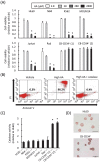
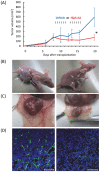
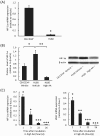
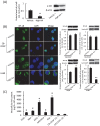
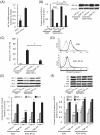
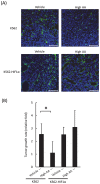
Similar articles
-
Ascorbic acid, but not dehydroascorbic acid increases intracellular vitamin C content to decrease Hypoxia Inducible Factor -1 alpha activity and reduce malignant potential in human melanoma.Biomed Pharmacother. 2017 Feb;86:502-513. doi: 10.1016/j.biopha.2016.12.056. Epub 2016 Dec 23. Biomed Pharmacother. 2017. PMID: 28012930
-
[Effects of hypoxia-inducible factor inhibitor on expression of HIF-1alpha and VEGF and induction of apoptosis in leukemic cell lines].Zhongguo Shi Yan Xue Ye Xue Za Zhi. 2010 Feb;18(1):74-8. Zhongguo Shi Yan Xue Ye Xue Za Zhi. 2010. PMID: 20137122 Chinese.
-
Ascorbic acid and ascorbate-2-phosphate decrease HIF activity and malignant properties of human melanoma cells.BMC Cancer. 2015 Nov 7;15:867. doi: 10.1186/s12885-015-1878-5. BMC Cancer. 2015. PMID: 26547841 Free PMC article.
-
HIF-α Promotes Chronic Myelogenous Leukemia Cell Proliferation by Upregulating p21 Expression.Cell Biochem Biophys. 2015 May;72(1):179-83. doi: 10.1007/s12013-014-0434-2. Cell Biochem Biophys. 2015. PMID: 25596666
-
Hypoxia influences stem cell-like properties in multidrug resistant K562 leukemic cells.Blood Cells Mol Dis. 2013 Oct;51(3):177-84. doi: 10.1016/j.bcmd.2013.05.003. Epub 2013 May 29. Blood Cells Mol Dis. 2013. PMID: 23725749
Cited by
-
High-dose vitamin C as a metabolic treatment of cancer: a new dimension in the era of adjuvant and intensive therapy.Clin Transl Oncol. 2025 Apr;27(4):1366-1382. doi: 10.1007/s12094-024-03553-x. Epub 2024 Sep 11. Clin Transl Oncol. 2025. PMID: 39259387 Review.
-
High-Dose Vitamin C in Advanced-Stage Cancer Patients.Nutrients. 2021 Feb 26;13(3):735. doi: 10.3390/nu13030735. Nutrients. 2021. PMID: 33652579 Free PMC article. Review.
-
Extracellular iron diminishes anticancer effects of vitamin C: an in vitro study.Sci Rep. 2014 Aug 5;4:5955. doi: 10.1038/srep05955. Sci Rep. 2014. PMID: 25092529 Free PMC article.
-
Epigenetic Regulators of DNA Cytosine Modification: Promising Targets for Cancer Therapy.Biomedicines. 2023 Feb 21;11(3):654. doi: 10.3390/biomedicines11030654. Biomedicines. 2023. PMID: 36979633 Free PMC article. Review.
-
Hypoxia and Hypoxia-Inducible Factors in Leukemias.Front Oncol. 2016 Feb 26;6:41. doi: 10.3389/fonc.2016.00041. eCollection 2016. Front Oncol. 2016. PMID: 26955619 Free PMC article. Review.
References
-
- Creagan ET, Moertel CG, O'Fallon JR, Schutt AJ, O'Connell MJ, et al. (1979) Failure of high-dose vitamin C (ascorbic acid) therapy to benefit patients with advanced cancer. A controlled trial. N Engl J Med 301: 687–690. - PubMed
-
- Moertel CG, Fleming TR, Creagan ET, Rubin J, O'Connell MJ, et al. (1985) High-dose vitamin C versus placebo in the treatment of patients with advanced cancer who have had no prior chemotherapy. A randomized double-blind comparison. N Engl J Med 312: 137–141. - PubMed
-
- Padayatty SJ, Sun H, Wang Y, Riordan HD, Hewitt SM, et al. (2004) Vitamin C pharmacokinetics: implications for oral and intravenous use. Ann Intern Med 140: 533–537. - PubMed
Publication types
MeSH terms
Substances
LinkOut - more resources
Full Text Sources
Other Literature Sources
Medical
Research Materials

